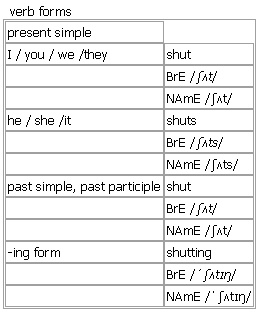|
Từ điển Oxford Advanced Learner 8th
 shut
shut

shut [shut shuts shutting] verb, adjective BrE [ʃʌt] NAmE [ʃʌt]
verb (shut·ting, shut, shut)
1. transitive, intransitive ~ (sth) to make sth close; to become closed
• Philip went into his room and shut the door behind him.
• I can't shut my suitcase— it's too full.
•She shut her eyes and fell asleep immediately.
•He shut his book and looked up.
•The window won't shut.
•The doors open and shut automatically.
2. intransitive, transitive ~ (sth) (BrE)when a shop/store, restaurant, etc. shuts or when sb shuts it, it stops being open for business and you cannot go into it
• The bank shuts at 4.
• We left the hotel only to discover that the whole city shuts at 10.30.
more at close/shut the door on sbshut/slam the door in sb's face at ↑door, shut/close your ears to sth at ↑ear, shut/close your eyes to sthwith your eyes shut/closed at ↑eye n., keep your mouth shut at ↑mouth n.
Verb forms: 
Word Origin:
Old English scyttan ‘put (a bolt) in position to hold fast’, of West Germanic origin; related to Dutch schutten ‘shut up, obstruct’, also to ↑shoot.
Thesaurus:
shut verb T, I
•I can't shut my suitcase— it's too full.
close • • slam • • draw • • lock • • bolt •
Opp: open
shut/close/slam/lock/bolt a door/gate
shut/close/lock a window/drawer/case/suitcase
shut/close a/an/your box/lid/eyes/mouth/flap/valve/book/umbrella
close/draw the curtains/blinds
Shut or close? Close often suggests a more slow or gentle action than shut
•Close your eyes and go to sleep.
Which Word?:
close / shut
You can close and shut doors, windows, your eyes, mouth, etc.
Shut can suggest more noise and is often found in phrases such as slammed shut, banged shut, snapped shut.
Shut is also usually used for containers such as boxes, suitcases, etc.
To talk about the time when shops, offices, etc. are not open, use close or shut: ▪ What time do the banks close/shut? ◇ ▪ A strike has shut the factory. You can also use closed or shut (NAmE usually closed): ▪ The store is closed/shut today. Especially in NAmE, shut can sound less polite.
Closed is used in front of a noun, but shut is not: ▪ a closed window.
We usually use closed about roads, airports, etc: ▪ The road is closed because of the snow.
Close is also used in formal English to talk about ending a meeting or conversation.
Example Bank:
•I can't shut my suitcase— it's too full.
•I shut my eyes against the bright light.
•The window won't shut.
Idioms: ↑shut up shop ▪ ↑shut your mouth
Derived: ↑shut down ▪ ↑shut off ▪ ↑shut somebody away ▪ ↑shut somebody in ▪ ↑shut somebody off from something ▪ ↑shut somebody out ▪ ↑shut somebody up ▪ ↑shut something down ▪ ↑shut something in something ▪ ↑shut something off ▪ ↑shut something up ▪ ↑shut up ▪ ↑shut yourself away ▪ ↑shut yourself off
adjective not before noun
1. not open
Syn: ↑closed
• The door was shut.
• She slammed the door shut.
•Keep your eyes shut.
2. (BrE)not open for business
Syn: ↑closed
• Unfortunately the bank is shut now.
Word Origin:
Old English scyttan ‘put (a bolt) in position to hold fast’, of West Germanic origin; related to Dutch schutten ‘shut up, obstruct’, also to ↑shoot.
Example Bank:
•He slammed the case shut.
•His jaw was clenched shut.
•I clamped my mouth shut.
•I'll leave the window shut for now.
•She snapped shut a file on her desk.
•She squeezed her eyes shut to keep the tears from coming.
•The bars all look shut to me.
•The curtains were drawn shut.
•The door was firmly shut.
•The doors closed shut behind me.
•The elevator door slid shut.
•The gates are always kept shut.
•The park is now shut for the winter.
•The window blew shut.
•The windows were sealed shut.
|
|
|
▼ Từ liên quan / Related words
Related search result for "shut"
|
|
